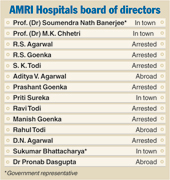 |
Seven of the 14 directors of AMRI Hospitals Dhakuria have been arrested in connection with Friday’s fire that claimed 92 lives but the spotlight of investigation is yet to swing to the other directors.
According to legal provisions, all directors of AMRI Hospitals Limited are liable under the criminal law if they were in charge of day-to-day operations. “This presumption, however, can be rebutted by the accused at the stage of trial,” said a legal expert.
Sources told Metro that police have targeted the share-holders of AMRI Hospitals in the first round of arrests. According to filings by the company, the Goenka and Agarwal families, which own the Emami group, have 66 per cent stake in AMRI Hospitals Ltd while the Todi family owns around 32 per cent and the Bengal government has 1.9 per cent.
The other members on the board are Rahul Todi, Aditya Agarwal, Priti Sureka, Dr M.K. Chhetri, Dr Pronab Dasgupta and two government representatives — Dr Soumendra Nath Banerjee and Sukumar Bhattacharya (see chart). “We are looking into the legal provisions before taking the next step with regard to the other directors,” said a senior police officer.
Dasgupta told Metro late on Sunday that he was not involved in the day-to-day running of AMRI Hospitals. “I only look into the medical aspects. I oversee treatment protocol, medical education and patient complaints on negligence,” Dasgupta said over the phone from an undisclosed location.
“I had to leave the city early on Friday to attend a pre-scheduled medical conference. I came to know about the fire only after I arrived at my destination abroad.... I haven’t received any phone calls from the police,” he added.
Chettri, the managing director of the hospital, is in town but was not available for comment. A source close to him, however, suggested that like Dasgupta, he too was only involved in the hospital’s medical administration.
AMRI Hospitals Dhakuria’s licence is in the name of Chettri. The state health department had cancelled the licence of Annexe I after informing him on Friday.
Priti Sureka, another director, is also in town but has not been interrogated.
Six of the seven directors — S. K. Todi (69), Ravi Todi (42), Prashant Goenka (38), Manish Goenka (37), Radheshyam Goenka (65) and Dayanand Agarwal (64) — were produced in the Alipore court on Saturday. R.S. Agarwal (67), the other arrested director, is undergoing treatment in a private hospital. All seven will be in police custody till December 19.
There are two types of directors: executive and non-executive. At AMRI Hospitals, except for D.N. Agarwal, all other board members are non-executive directors. Non-executive directors take only policy decisions and are not involved in day-to-day running of the company.
“Keshub Mahindra was a non-executive director of Union Carbide India during the Bhopal gas tragedy. He got bail only on that ground. He faced trial and was convicted for criminal negligence, unlike the AMRI directors who will go on trial for culpable homicide not amounting to murder,” said the expert.
The AMRI directors have been booked under IPC sections 304 (culpable homicide not amounting to murder), 308 (attempt to commit culpable homicide not attempting to murder), 285 (negligent conduct with respect to fire and combustible matter) and several sections under the West Bengal Fire Services Act related to negligence.
According to AMRI sources, board meetings were held four times a year. “Usually, most of the directors used to be present. R.S. Agarwal, because of ill-health, was irregular,” said a source. The affidavit submitted to the fire services department in which the authorities promised that they would comply with all the fire norms never came up for discussion at the board meetings, said a source. “The senior officials of the hospital never mentioned it to the board.”
Executives such as a medical superintendent can also be held liable unless s/he can prove that the act took place without his/her knowledge and the fact that s/he had taken all reasonable precautions to prevent the act, said a legal expert. “If the person can establish that s/he acted under orders of a superior authority, s/he can escape with a lesser punishment but cannot completely be exonerated from all liability.”










